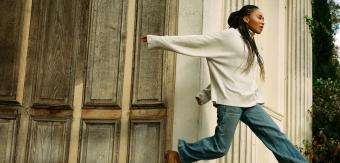
You can hardly move in an inch in a shop these days without being confronted with fair trade this and that and an ending array of ethical options for your every consumer need. Once an option for dreadlocked hippies and mother earth types, ethical living has become a necessary way of life in modern times when draining the planets resources and exploiting impoverished people is just not an acceptable way to carry on any more. That said, there is still a hell of a lot of exploitation and reckless greed going on at the end of the chains of production, particularly in the fashion industry. It still seems that the vast majority of people want their fashion fast and cheap and they dont pause to think much about where or how their £5 shirt has come to land in their wardrobe.
Last year it was reported that 95% of American clothing companies use sweatshops. The big companies themselves dont own or run the workshops so it can seem like a hopeless battle when trying to avoid products which have been produced in this way, but at the end of the day it is us, the consumers, who provide the cash to fund the big companies and our choices will eventually reverberate back to the source of the clothing.
One vital step when trying to dress more ethically is avoiding the companies who have been named and shamed for their dodgy production methods. Treehugger.com has named and shamed 7 of the biggest sinners which includes H&M - their New York store was accused of cutting up bags of unsold merchandise and dumping it in unmarked bags during one of the coldest winter periods, they have also been accused of committing organic cotton fraud and a fire at one of their Bangladeshi workshops needlessly killed 21 workers. Also on the list is Abercrombie + Fitch, who run a sweatshop on the island of Saipan, which sets its own immigration laws, A+F bring in workers with the promise of a stable job and then make them pay back their $7,000 'immigration fee' by working 12 hour sewing shifts. Gap are also likely culprits, with children as young as eight working in their workshops and reports of pregnant women being forced to abort their babies so they can keep on working. Nike (who also makes Converse shoes) is also under the spotlight and is trying to take green steps to compensate for its bad reputation, as is Calvin Klein. All eyes are of course on Primark who have taken great steps to clean up their image in recent years.
Avoiding these companies would be a massive step towards making the whole hightstreet more ethical, although experts say that the real change can only come about when China changes its labour laws, but even then the sweatshops would just move to developing countries such as South America, where the practice can continue.
If researching extensively into each high street brand for it's code of conduct sounds like too much hard work then there are other steps which can be taken towards a greener wardrobe which include buying vintage (my personal preference), buying less quantity of cheap clothes which wont last and instead buying fewer, higher quality pieces and of course supporting the companies who have a focus on ethical business practice.
There are shed loads of ethical companies out there now, all of which work in different ways. You've got labels who support charity projects such as Edun who make organic cotton t shirts with prints designed by African school children, all the funds from the sales of the t-shirts go back into the children's school. There are also companies who only use natural, organic fibres and non-carcinogenic dyes such as the vibrant tie-dye dresses by Ada Zanditon and then you've got the companies who reuse and upcycle unwanted clothes such as Komodo who started off selling patchwork denim jackets made from old Levis on Brick Lane and the luxury art-eco fashion label Issi who collaborate with award-winning artists to produce chic accessories from waste material.
So when you next iron your shirt for work, cast a thought to the person who constructed it and think about how your purchasing power can ultimately change the world if enough people start thinking about the bigger picture and less about themselves.
Jessica Hazel
Writer, blogger and vintage trader.
http://creativepool.co.uk/jessicahazel




